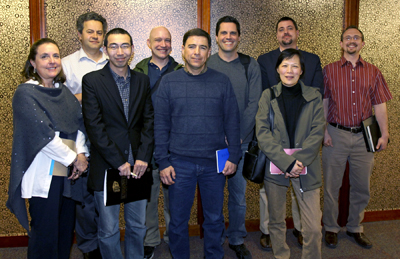By Lisa Y. Garibay
UTEP News Service
On Feb. 20, a group of ambitious UTEP professors gathered for the first-ever orientation presented for Interdisciplinary Research (IDR) Enhancement Program grant recipients. As part of UTEP’s Office of Research and Sponsored Projects (ORSP), the IDR Program has now provided three opportunities for faculty and staff to propose new projects that harness expertise from a range of disciplines, thus fostering greater collaboration across departments and colleges.
The IDR grants contribute to the more than $79 million UTEP is spending annually on research.
During his introduction to the program delivered to orientation attendees, Vice President for Research Roberto A. Osegueda, Ph.D., pointed out that research on the UTEP campus has historically been focused within individual disciplines; rarely were multiple principal investigators (PIs) represented on a project proposal, much less PIs from various departments or areas of study. Osegueda himself discovered the benefit of cross-disciplinary work as a junior assistant professor who partnered with a senior professor on a project that was funded by NASA. Since then, he has dedicated himself to promoting such connectivity at the university.
“Over the short life of the IDR Enhancement Program, we are beginning to observe indications that we are heading in the right direction,” Osegueda said. “Among these are an increase of faculty engaging in IDR activities, an increase in comfort among the faculty to work across disciplines, and the successes of IDR teams in securing external funding and publications.“
For Round 3 of the IDR grant program, the projects and their principal investigators are:
– “Conducting Research in Violent Binational Educational Settings with Vulnerable Populations: What Children Learn in Times of Vulnerability” (Beverley Argus-Calvo, Ph.D., associate professor of educational psychology and special services). The team of scholars will begin to identify how the effects of violence are evidenced in elementary and middle schools situated in different contexts along the U.S. – Mexico border.
– “Research on Contextualizing K-12 Mathematics Education within the Real World Context of Musical Composition and Musical Instrument Design” (Daniel Tillman, Ph.D., assistant professor of teacher education). The team will focus efforts on research studying the use of musical composition and musical instrument design activities as a context for mathematics education where the real world problem-solving power of math skills will be demonstrated and explored.
– “Study of Removal of Contaminants of Emerging Concerns in Municipal Wastewater” (Wen-Yee Lee, Ph.D., associate professor of chemistry). The goal of this study is to develop an effective treatment for the removal of endocrine disrupting compounds (EDCs) in reclaimed water and drinking water.
– “Development and analysis of a new preclinical model of Her-2 positive human breast cancer” (Giulio Francia, assistant professor of biological sciences). The team will work to develop a new preclinical model of human breast cancer, which will increase visibility and collaborations with external cancer researchers, and use new models to gather preliminary data for the submission of an R21 grant to the National Institutes of Health (NIH).
– “Multispectral Analysis of Facial Skin: Detecting Emotional State” (Olac Fuentes, associate professor of computer science). The goal of this project is to study the possibility of automatic real-time extraction of information about a person’s emotional conditions from the analysis of multispectral image video sequences of their faces.
“The grant is wonderful news!” Francia said. “We had been looking for support to complete a long-term study on new models for breast cancer. The funding we received from the IDR will allow us to generate two novel breast cancer cell lines, which are much needed tools for further research. The IDR support will also have a huge impact on the development of my student Karla Parra, who will use the funds to travel to the lab of our colleagues in Toronto, which will greatly enhance our collaborative efforts.”
Argus-Calvo, another IDR grant recipient, said, “Receiving the IDR funds is providing the unique opportunity for a group of scholars from UTEP and Mexico to develop a cross-border, interdisciplinary and collaborative investigation on the effects of violence on children’s learning.”
Candid discussion of the IDR collaborative experience by a previous grant recipient team also took place during the orientation. The team – whose disciplines spanned environmental science, sociology, education and nursing – encouraged the new grantees on everything from time management to future funding opportunities. Orientations will continue to be held to along with other networking opportunities for current and upcoming grantees.
The IDR Enhancement Program mainly solicits proposals for interdisciplinary research enhancement in UTEP’s priority research areas (health and biomedical sciences and engineering, energy and environment, education for the 21st century demographic, national defense and border security, and global enterprise and border studies). Awards are made to emerging interdisciplinary teams in two categories: (1) Level 1 awards of up to $5,000 per team and (2) Level 2 awards of up to $20,000 per team. Teams must have at least one member from three UTEP departments with preference given to teams that cross colleges. Further eligibility requirements, proposal structure, and review processes and criteria for both levels can be found on the IDR page of the ORSP website.
The IDR Enhancement Program was established in 2011 under the leadership of then Associate Vice President for Research Ann Gates, Ph.D., and Provost Junius Gonzales and managed by ORSP’s Proposal Development Office. The program now is under the leadership of Associate Vice President for Research Chris Meissner, Ph.D., and IDR Network Manager Andrea Tirres. It continually seeks to assist UTEP faculty with cultivating research potential and not only acquiring university funding but also extramural funding for further study.
The next round of grants will be awarded later in 2013 to benefit an even wider pool of faculty collaboration at UTEP.
As grantee Lee explained, the program is a great asset for UTEP faculty.
“I am so thrilled to get the IDR grant, which supports me to work with two very talented and super friendly researchers on a project that we all care deeply about,” Lee said.
